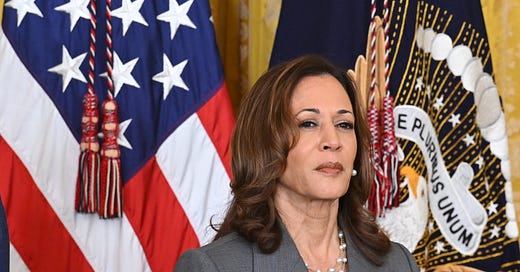
Kamala Harris Was Dukakis-ed
The vice president didn’t apply the most fundamental lesson from the past thirty-plus years: Answer your attacks head on.
JOE BIDEN IS LIKELY SITTING IN in the Oval Office today wondering how his vice president lost to a twice-impeached convicted felon.
Part of the answer lies in the key lesson learned from the first presidential cycle Biden ran in back in 1988: An attack unanswered is an attack believed.
It may surprise anyone under 50 to know that there was a time when opposition research and rapid response were not central parts of a political campaign. They are today because of what happened to Michael Dukakis, the Democratic nominee in 1988. Up 17 points over Vice President George H.W. Bush after the Democratic convention, he went on to lose by over 7 million votes and an Electoral College landslide of 426 to 111, making Bush the only vice president in the postwar era to win a promotion to the presidency from the electorate.
Led by strategist Lee Atwater, the Bush campaign methodically and relentlessly found ways to suggest that Dukakis—a technocratic liberal governor of Massachusetts—was a wild-eyed radical out of step with America. He was attacked for not being patriotic, and defending those who refused to say the Pledge of Allegiance. He was skewered for being soft on defense. And he was pilloried for being soft on crime, a charge driven home by the now infamous “Willie Horton” ad. In a presidential debate, Dukakis’s non-support for the death penalty even if his wife was raped and murdered drove that home even further. It became a Bush ad:
MALE NARRATOR [and TEXT]: One person has released killers sentenced to life without parole on unsupervised weekend passes, pardoned 49 convicted drug dealers and offenders and commuted the sentences of a record 53 murderers. But how did Michael Dukakis defend his record in the debate?
MICHAEL DUKAKIS: I’m opposed to the death penalty. I think everybody knows that. I’m also very tough on violent crime.
(Audience laughter.)
MALE NARRATOR: Even Michael Dukakis can’t say he’s tough on crime with a straight face.
In response to all these attacks, Dukakis did . . . nothing.
As Dukakis told filmmaker Will Rabbe in his documentary, Above the Fray: The Lessons of Dukakis ’88: “I had made the decision that I was not going to respond to the Bush attack campaign. . . . We certainly had no plans for dealings with these attacks. That was my decision and no one else’s. It turned out to be a very bad decision.”
That painful loss in 1988 directly led the next Democratic standard-bearer, Bill Clinton, to set up a literal “war room” to respond to attacks. And in the years since, opposition research has become an art form, with trackers following every step an opponent takes on the trail waiting for a gaffe, to keyboard jockeys mining social media for an embarrassing post. Those who insisted on being above the fray, such as Sen. Bill Bradley in the 2000 Democratic primaries, lost.
Yet a review of this year’s ad spending reveals the puzzling choice by the Harris campaign to revert back to the ways of the Duke—even as she faced a relentless barrage of Trump attacks, akin to what Bush did to Dukakis nearly four decades ago.
Team Trump ran ads such as “Dangerously Liberal” that argued Harris would reduce meat consumption, ban fracking, and force a mandatory buyback program for guns. If the message wasn’t clear enough, it included an audio clip of her saying, “Yeah, I am a radical.”
Echoing Willie Horton, the MAGA super PAC spent more than $26 million hammering this message:
As San Francisco DA, liberal Kamala Harris let killers go free. And as California Attorney General, Kamala continued to put criminals first after a little girl was raped and buried alive, laws were passed to keep sex offenders away from children. Kamala ignored Jessica’s law and allowed convicted sex offenders to live near schools and parks. Kamala Harris has always put criminals first.
According to NPR, this was the highest-funded ad by any outside, pro-Trump group.
If that wasn’t enough, Trump spent at least $17 million on an ad highlighting Harris’s support for “taxpayer-funded sex changes for prisoners.” The ad ran tens of thousands of times during national football games and across swing states, all with the memorable tagline: “Kamala is for they/them. Trump is for you.”
The response from Harris was Dukakisesque: “I believe we should follow the law,” noting that the Trump administration had the same policy on prisoner health care that Biden-Harris did.
This is like countering a bunker-buster bomb with a BB gun. Harris could have cut an ad where she explained her position on this hot-button issue or even given a major speech on her vulnerabilities, much like Barack Obama did on race in 2008, defusing his relationship with a firebrand minister and defanging the issue overall.
But save for one ad that laid out how tough the vice president was on immigration and crime associated with it, the Harris side did not respond in kind to any of these attacks.
Why not respond harder? One reason may be that the campaign concluded it was better to not engage on subject matters where she was inherently disadvantaged. Another may be that they were, as Matt Yglesias put it, prioritizing “coalition management” ahead of winning over the vast center of the electorate—that they were afraid of angering Democratic interest groups skeptical of strong law enforcement, tough immigration policy, and any deviation from progressive orthodoxy on race and gender. Or it could be that they just didn’t see these issues as legitimate concerns.
Whatever the reason, Harris allowed herself to be defined and then disqualified. Trump prevented her from crossing a threshold of acceptability on these cultural issues so that voters could hear her more compelling message about the economy, which was the predominant focus of her ads. She was, in short, Dukakis-ed.
At the end of Rabbe’s documentary, Dukakis wistfully comes to grips with the shortcomings of his strategy, summing it up as follows: “We didn’t do what, I’m sorry to say, you have to do in these campaigns. And that’s one of the great lessons of ’88, sadly. And that is you’ve got to anticipate the attack campaign. And you have to have a carefully thought-out strategy for dealing with it in advance of when it happens. . . . I obviously made huge mistakes.”
Apparently, so did Kamala Harris.
Kenneth Baer, the founder of Crosscut Strategies, is the author of Reinventing Democrats: The Politics of Liberalism from Reagan to Clinton.

















